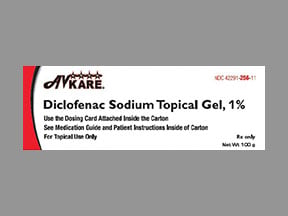
Gnp Diclofenac Sodium Coupons & Savings Card – Discount Prices from $9.65
Brand for: Diclofenac sodium
My prescription
Edit
100GM of 1%, Diclofenac Sodium (1 Tube)
Select pharmacy

Albertsons
$9.65
COUPON PRICE
Walgreens
$10.99
COUPON PRICE
Walmart
$19.56
COUPON PRICEGnp Diclofenac Sodium savings card
Show this card to your pharmacist
Albertsons
$9.65
BIN
ID
PCN
GRP
019876
LH9685B136
CHIPPO
LHX
Powered by
More prescriptions for rheumatoid arthritis
More prescriptions for rheumatoid arthritis
Price history for Gnp Diclofenac Sodium (brand) & Diclofenac Sodium (generic)
1 Tube, 100GM
Average retail price for Gnp Diclofenac Sodium
Average retail price for Diclofenac Sodium
Average SaveHealth price for Diclofenac Sodium
Our price history data is based on aggregated prescription data collected from participating pharmacies in America. Our prescription data updates daily to reflect the latest price changes. If you notice a missing data point, it means there wasn't sufficient data available to generate a monetary value for that date.
Over the last 12 months, the average discount price of Gnp Diclofenac Sodium is $14.00 using the SaveHealth savings card. That's an average savings of 66.12% on Gnp Diclofenac Sodium with our discount card.
*Retail prices are based on pharmacy claims data, and may not be accurate when we don't have enough claims.
Gnp Diclofenac Sodium (Diclofenac Sodium) dosage forms
Dosage Quantity Price from Per unit 100GM 1 Tube $9.65 $9.65 100GM 2 Tubes $11.80 $5.90 100GM 3 Tubes $13.95 $4.65 100GM 4 Tubes $16.10 $4.03 100GM 5 Tubes $18.26 $3.65
| Dosage | Quantity | Price from | Per unit |
|---|---|---|---|
| 100GM | 1 Tube | $9.65 | $9.65 |
| 100GM | 2 Tubes | $11.80 | $5.90 |
| 100GM | 3 Tubes | $13.95 | $4.65 |
| 100GM | 4 Tubes | $16.10 | $4.03 |
| 100GM | 5 Tubes | $18.26 | $3.65 |
Is diclofenac a strong painkiller?
Diclofenac is considered a nonsteroidal anti-inflammatory drug (NSAID) and is effective in reducing inflammation and pain. It is generally used for mild to moderate pain, such as that associated with arthritis, menstrual cramps, or minor injuries. While it is effective, it is not classified as a strong painkiller like opioids.
Why don't doctors like prescribing diclofenac?
Doctors may be cautious about prescribing diclofenac due to its potential side effects and risks. Diclofenac, a nonsteroidal anti-inflammatory drug (NSAID), can increase the risk of cardiovascular events such as heart attack and stroke, especially with long-term use or in patients with existing heart conditions. It can also cause gastrointestinal issues, including ulcers and bleeding. Due to these risks, doctors often weigh the benefits and risks carefully and may opt for alternative medications with a more favorable safety profile.
What is the generic for Pennsaid?
The generic name for Pennsaid is diclofenac sodium topical solution.
Does diclofenac make you sleepy?
Diclofenac is not commonly associated with causing drowsiness or sleepiness. It is a nonsteroidal anti-inflammatory drug (NSAID) primarily used to relieve pain and reduce inflammation. However, if an individual experiences unusual side effects such as drowsiness, they should consult their healthcare provider.
Why won't my GP prescribe diclofenac?
There could be several reasons why a general practitioner might choose not to prescribe diclofenac. Diclofenac is a nonsteroidal anti-inflammatory drug (NSAID) that can increase the risk of cardiovascular events, such as heart attack or stroke, especially with long-term use or in patients with existing heart conditions. It can also cause gastrointestinal issues, such as ulcers or bleeding. If a patient has a history of these conditions or is at higher risk, the GP might opt for a different medication. Additionally, there may be concerns about potential interactions with other medications the patient is taking. It is important for the patient to discuss their specific situation with their GP to understand the reasoning behind the decision.
